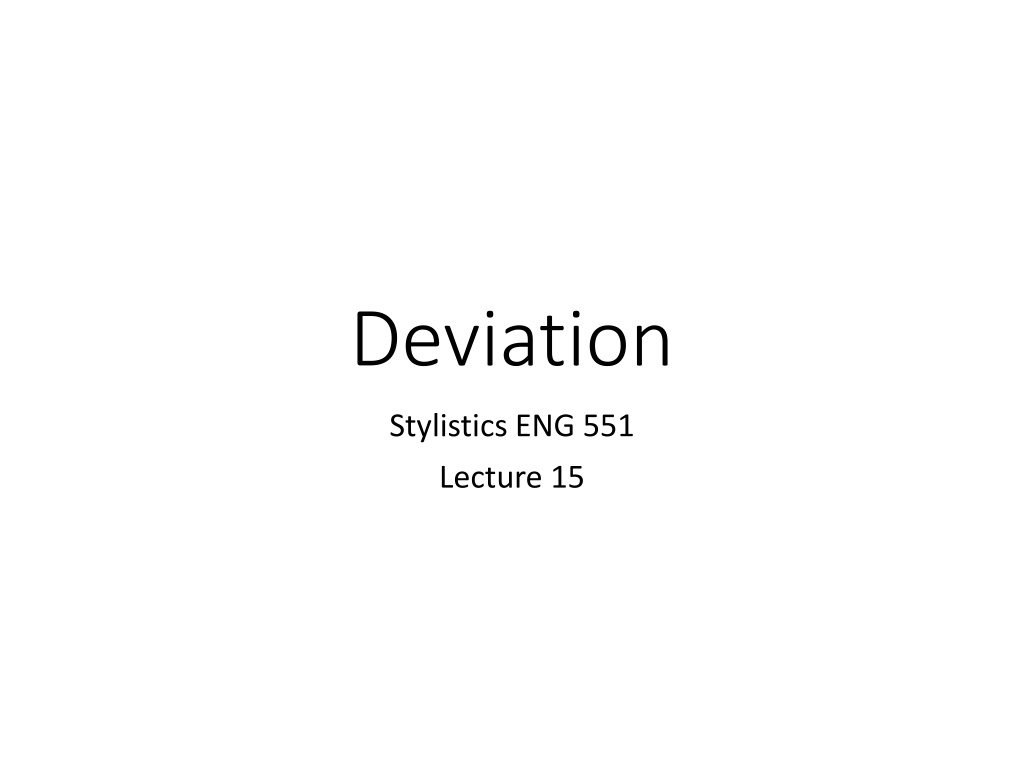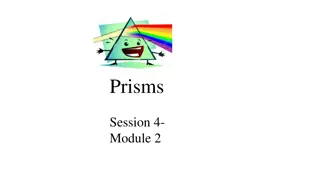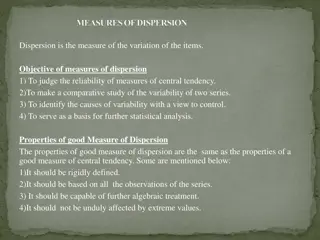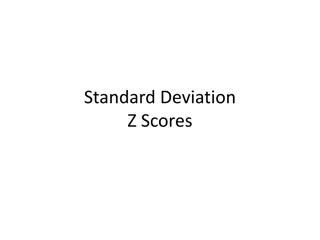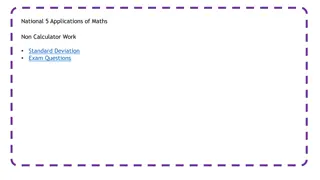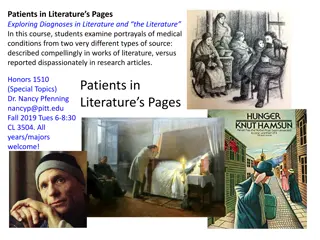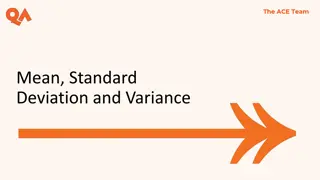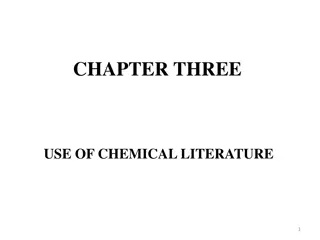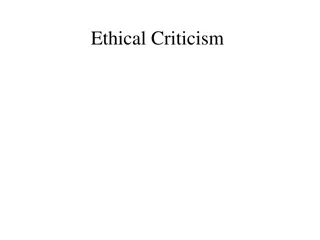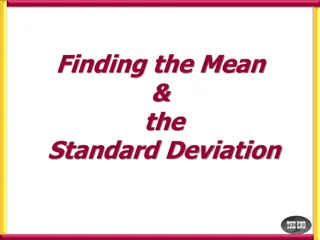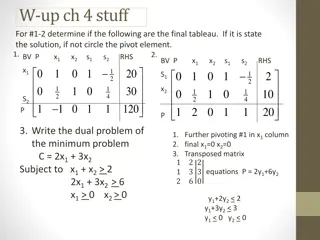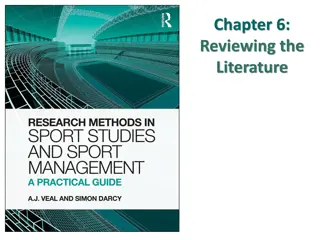The Significance of Deviation in Literature
Linguistic deviation in literature serves to disrupt the normal processes of communication, challenging readers with non-traditional expressions and interpretations. Writers use deviation to create unique aesthetic value in their works, prompting readers to delve deeper into unfamiliar compositions and uncover hidden meanings. By deviating from conventional norms, literature is revitalized and enhances the reader's understanding and appreciation of art.
Download Presentation

Please find below an Image/Link to download the presentation.
The content on the website is provided AS IS for your information and personal use only. It may not be sold, licensed, or shared on other websites without obtaining consent from the author.If you encounter any issues during the download, it is possible that the publisher has removed the file from their server.
You are allowed to download the files provided on this website for personal or commercial use, subject to the condition that they are used lawfully. All files are the property of their respective owners.
The content on the website is provided AS IS for your information and personal use only. It may not be sold, licensed, or shared on other websites without obtaining consent from the author.
E N D
Presentation Transcript
Deviation Stylistics ENG 551 Lecture 15
Deviation A linguistic deviation is a disruption of a normal process of communication. Linguistic deviations are considered to be hindrances in the process of communication and comprehension of meaning. In linguistic deviation non-significant and even non- sensical becomes significant which demands interpretation on part of the reader. a writer may violate conventional literary/linguistic rules in order to convey novel idea to the reader.
A work of art in some way deviates form the norms and it violates grammatical rules in order to communicate. Linguistic deviations are the abnormalities in the expression which appear in the particular piece of writing. This deviation becomes a foregrounded feature. The basic reason of the use of deviation is to renew and refresh readers perception about the ordinary and familiar things by presenting them in a new and interesting way.
The reader is made to stop and think on encountering a deviation. For example the phrase a grief ago presents the violation of the normal or regular process of communication. As the phrase is disrupting the conventional pattern that may be a year ago . The poet s violation in the form of deviation surprises the readers and they judged it against the familiar and regular pattern.
Why is Deviation used in Literature? A writer uses deviation to create a unique and new expression which is associated with the aesthetic value of the literary work. It makes the work stand out as different and unique form among the rest of the works. The writers strive to achieve excellence in their work and it is made different by the use of deviation. The literary writings are meant to give aesthetic pleasure to the reader. Rather than communicating something plainly and directly. writer s focus on prolonging the process of reading and comprehension of meaning.
Why is Deviation used in Literature? The reader is supposed to take delight and arrive at a meaning which he digs out of the unusual composition or linguistic deviation. The deviation also makes it easier for the writer to express the inexpressible. Feelings and ideas which cannot be directly expressed or commented upon due to social, moral, cultural restraint. So the literary artists choose an artful way to comment upon these ideas through deviation.
Deviation reinvigorates literature The writers show their individual talent by creating unique ways of expression. Thus Deviation becomes a means through which literature gains new energy. As it is the newness and innovation which leads to the survival and appreciation of art and keeps it form becoming uninteresting.
Deviation and the Elements of Interest and Surprise: Anyone who wishes to investigate the significance and value of work of art must concentrate on the element of interest and surprise than on automatic pattern. The two elements of interest and surprise are closely connected with deviation. 1. The element of Interest: A deviation first of all evokes the interest of the reader. Since a deviation is unusual use of language and expression it appears appealing as the reader finds it different.
Deviation and the Elements of Interest and Surprise: As Coleridge says: The prime merit of literary genius is the representation of familiar objects in order to evoke freshness of sensation So a writer may violate linguistic norms in order to give a novel idea to the reader and to draw his attention and to arouse his interest. Deviation leaves a gap in the normal process of communication, a common reader may not indicate these linguistic abnormalities while reading but a reader familiar with the art of writing understands what these linguistic abnormalities stand for.
Example Unreal City (Wasteland by T.S. Eliot) There is semantic deviation in the phrase therefore the interpretation cannot be according to literary norms. By using the word unreal to refer to the city of London the poet highlights the condition and the artificiality of the city. One who reads it is surprised and feels interested to interpret how a city is unreal. Eliot uses Euphemism. For the condition of city or to show dead and barren city he uses indirect phrase to represent its barrenness and artificiality. Unreal is also a Pun because it represent the fantasy that it if it is unreal it might be brilliant. But symbolically it presents the pathetic condition of the people of the city. The poet also capitalizes the first letter to foreground it graphologically.
2. The Element of Surprise: The deviations are apparently confusing and seem strange and abnormal as these do not fit into the regular process of communication. As a result the reader feels surprise on encountering such abnormalities in writing. He questions what does it mean? how is it possible? What is its significance? Also surprise is experienced when the reader interprets a deviation and finds out that what apparently appeared unbelievable and or abnormal makes sense at deeper level.
Example O Wild West Wind, thou breath of Autumn s being, Thou, from whose unseen presence the leaves dead (Shelley, Ode to the West Wind) the poet addresses wind as if it is a human being.( Use of apostrophe) The element of surprise also arises when he calls west wind the breath of autumn. As autumn destroys the beauty of spring.
